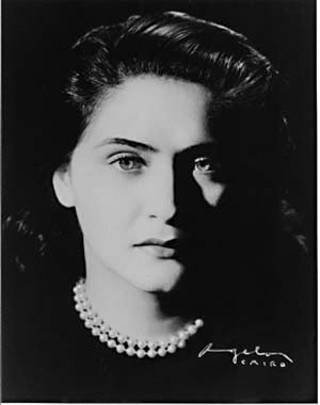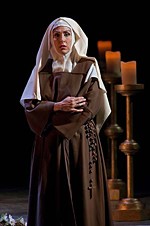'Dialogues of the Carmelites'
A changed life
By Robert Faires, Fri., April 17, 2009

When Dialogues of the Carmelites opens at the Long Center Saturday night, the Austin Lyric Opera production will have just one degree of separation from the very first staging at La Scala in 1957. That's because in the audience, as ALO's special guest for the performance, will be Virginia Zeani, the renowned soprano who originated the role of the young nun Blanche de la Force. Dialogues holds a special place in Zeani's heart and not only because of her part in the premiere. The opera turned out to be as transformative for the singer as it was for her character.
Zeani had been in Paris singing in La Traviata, and Francis Poulenc was, like most everyone else, smitten with her Violetta. (Zeani so excelled in the role that she'd performed it more than 100 times already, just eight years into her career.) Poulenc approached her personally for an opera he was writing about a convent of nuns facing death during the French Revolution. Zeani was unsure how this composer known for light, frivolous material, such as the surrealist opera The Breasts of Tiresias, would handle such weighty subject matter, but, she says, "I love his personality, so I say, 'Yes!'" And once the score arrived, she says, "I was so enchanted."
Dialogues came along at a significant point for Zeani, professionally and personally. She had been contracted to sing for a season at the Metropolitan Opera and just made her La Scala debut as Cleopatra in Handel's Giulio Cesare. "Till then, I was not thinking to marry," Zeani says. "I loved my career more than anything else." But her Caesar in that production, bass Nicola Rossi-Lemeni, conquered her heart. And he asked her to marry him.
Zeani credits Dialogues with changing the focus in her life. Now, she wanted a family and was willing to give up her professional ambitions for one, much as the opera's nuns were willing to sacrifice their lives: "I considered my career extremely important but not so necessary to my spiritual life. I became a human being, no more desiring to have publicity, no more desiring to have records, no more desiring to be the best in the world. This is the important thing that Blanche gave to me, that Poulenc explained to me. I adored him. The collaboration with Poulenc was a dream in my life, a beautiful dream."
More than 50 years later, Zeani's memories of the Dialogues premiere are still vivid. "Oh, it was a great success," she recalls. "We expected it to be a success, but we did not realize how much impact this opera – which I consider to be the best opera of the last century – would have. We start to have, after the first act, big applause. But after the scene where the sisters are decapitated, the people cried; the people applauded frantically. And I have to say, on the stage, we all were crying and Poulenc more than us. He was so happy. I think the moment that was most important to him in his career was that moment. I think this changed his life totally like it changed my life."
A panel discussion, La Voix Humaine: Understanding and Performing Francis Poulenc, featuring Virginia Zeani, will be held Friday, April 17, 7pm, in Ducloux Hall, 901 Barton Springs Rd.
Dialogues of the Carmelites runs Saturday, April 18; Wednesday, April 22; Friday, April 24; at 7:30pm; and Sunday, April 26, at 3pm, in Dell Hall at the Long Center for the Performing Arts, 701 W. Riverside. For more information, call 472-5992 or visit www.austinlyricopera.org.












